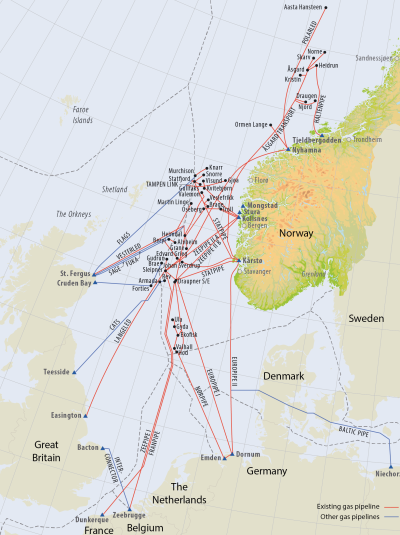Norway’s offshore oil and gas installations and pipelines have suddenly emerged as “probably Europe’s biggest sabotage goal,” according to one of the country’s leading military researchers. Both the government and various companies involved were scrambling on Wednesday to boost security around energy infrastructure, offshore platforms and both oil and gas plants on land.

“We have a major war in Europe right now,” Lt Col Geir Hågen Karlsen of the Norwegian Defence University College (Forsvarets høgskole) told Norwegian Broadcasting (NRK) after the suspected sabotage this week of Russia’s two Nord Stream pipelines that sent gas to Europe. “Norwegian gas supplies are probably the biggest and most strategically important goal in all of Europe right now as well.”
Karlsen is known for his mild manner when analyzing Russian President Vladimir Putin’s war on Ukraine during frequent appearances on NRK. His words Tuesday night when taking part in NRK’s debate program Debatten were anything but mild, as he outlined how anyone wanting to halt Europe’s aid to Ukraine could go about it: “They could use divers, submarines, unmanned (submersible) vessels or cyber attacks on land-based installations.”
He said he thinks “we should take the threat very seriously.” If there are any attacks on Norway’s gas pipelines to Europe, “we will be facing an extremely serious escalation of the conflict” with Russia.

Since Norway has become Europe’s largest single supplier of gas since Putin halted Russian deliveries (in an apparent attempt to cut off energy supplies and weaken support for Ukraine), it presents a hindrance to Putin’s plans to conquer Ukraine, or at least its eastern territories. While questions have arisen as to whether Russia is itself behind the serious damage to its own pipelines, there’s no question that Norway currently threatens Putin’s plans to divide and deprive Europe by cutting off gas supplies.
“If it is Russia that was behind (the pipeline damage), and I say ‘if’ because I’m not certain, I would think it’s a form of a political signal to the West,” Karlsen said, “where they’re saying ‘see what we can do, take us seriously.”
Professor Jakub M Godzimirski of the Norwegian foreign policy instute NUPI also thinks that if the Russians were behind the sabotage, they’re sending a signal “that they have the ability and willingness” to damage infrastructure. “What would be next on the list to damage the European energy market? Then Norway is a prime target,” Godzimirski told newspaper Aftenposten. “Damaging Norwegian energy infrastructure would have a major effect. I think and hope that Norwegian authorities are acting accordingly in this situation.”
They were at least trying to, with Justice Minister Emilie Enger Mehl claiming that the government “was taking this with the greatest seriousness” and both she and Oil & Energy Minister Terje Aasland making themselves available at Parliament on Wednesday to answer MPs’ questions. Aasland has already claimed that security measures were being boosted, while state oil and energy company Equinor announced it boosted security during the night. Police cars were seen outside a gas processing plant at Kollsnes in Øygarden, and special measures were put into place at Equinor offices, installations, helicopter landing pads and around supply vessels serving offshore platforms.
Never been so ‘strategically important’
Ståle Ulriksen, a senior instructor and researcher at Norway’s Naval Academy (Sjøkrigsskolen), suspects Russia sabotaged the pipelines in another effort to choke off gas supplies to Europe heading into winter. Meanwhile, he stressed to newspaper Aftenposten, Norwegian gas and energy gas and other energy deliveries have never been more strategically important.
“Therefore there’s never been a bigger reason to destroy them,” Ulriksen said. “It’s never been so dangerous as now and we have ignored that, put our heads in the sand.” He’s been stressing a need for stronger security, including guards at all of Norway’s gas facilities on land, since Putin invaded Ukraine in late February. Great Britain has had armed guards around its gas plants, he noted, but not Norway.
Hedda Langemyr, leader of an organization concentrating on foreign policy and security (UTSYN) and board leader at Nansenskolen, also urged more security around Norway’s offshore installations earlier this week, and wind power plants. “There’s been no lack of warnings that they’re mostly unprotected and easy to attack,” Langemyr wrote in a commentary in newspaper Dagsavisen on Tuesday.
‘New times demand new solutions’
She also stressed how Norway’s long coastline and vast offshore territory (five times as large as its actual land area) makes Norway also very strategically important simply from a geographic point of view. “Increased rivaly between super powers will demand more of us at sea,” she wrote, even before the gas pipeline vandalism became known.
Langemyr further noted how the current Labour-Center party-led government stated in its first platform last fall that Norway’s foreign policy will remain firm. “It shouldn’t,” wrote Langemyr. “New times demand new solutions.”
While Sweden and Denmark quickly set up crisis teams on Tuesday to deal with the dangerous gas leaks from the damaged pipelines around the Danish island of Bornholm, Norway did not, but there were more signs of urgency regarding security enhancement on Wednesday. Prime Minister Jonas Gahr Støre called a press conference to address security issues Wednesday afternoon and the state police directorate confirmed they were boosting preparedness around all Norwegian oil and gas installations. Security guards were placed at the Mongstad refinery on and Norwegian defense forces claimed they were ready to provide support around oil and gas installations if asked to do so.
“The incident in the Baltic Sea gives reason to extend and strengthen our security measures, without us being able to go into detail on what’s being done,” Tone Vangen of the police directorate told NRK. “For the police this is about contributing towards reducing vulnerablilty and securing assets in an uncertain situation.”
NewsinEnglish.no/Nina Berglund

